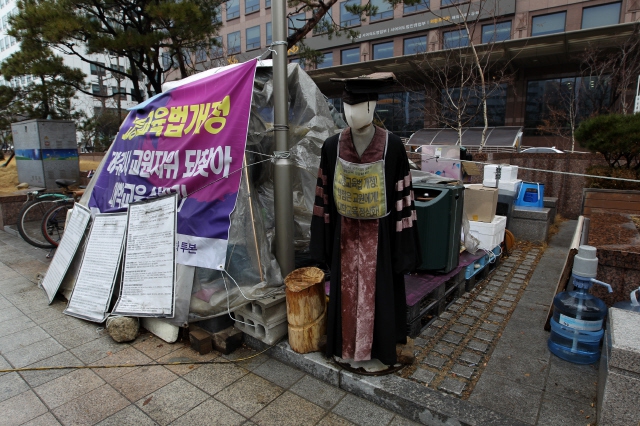 |
|
An hourly university lecturer calls for better working conditions in 2011. (Ryu Woo-jong, staff photographer)
|
Lecturers to be recognized as “teachers” alongside professors and teaching assistants
South Korean universities and lecturers reached a first-ever agreement on institutional improvements for the beleaguered instructors, including recognition of their status as teachers and a stronger social safety net with severance pay and health insurance guarantees. “Problems with the Higher Education Act have long remained unresolved, but over 18 rounds of discussions in the past five months, we have managed to reach a unified plan,” the university lecturer institutional improvement council – a 12-member group including university and lecturer representatives along with educational experts – announced on Sept. 3. The stakeholders’ agreement on a plan to improve the Higher Education Act – which has been derided as the “Lecturer Act” by critics for terms seen as leading to the employment of lecturers under poor working conditions – now appears poised to usher the end of a more than seven-year-long debate over the treatment of lecturers. To begin with, the plan includes the category of “lecturer” under institutional protections that in the past recognized only full and associate professors and teaching assistants as “teachers.” The title “hourly university lecturer” has also been integrated into the “lecturer” category. With their new teacher status, lecturers enjoy the same treatment as other teachers in terms of not being arbitrarily dismissed or asked to resign as long as they are not facing criminal punishment or in violation of their contractual terms. The term of employment is also to be changed from semester units to periods of at least one year. A lecturer subject to unfair disciplinary action or refused rehiring without legitimate grounds will now be entitled to a petition review. In the past, lecturers had been called “peddlers” due to their unstable status; with the agreement, they now enjoy minimum guarantees on employment security. Large improvements are also in store in terms of working conditions, wages, and welfare. As a rule, lecturers will not be made responsible for more than six class hours a week. Up to nine hours will be allowed in cases where the school president recognizes “special needs.” Other plans included paying lecturers a certain level of wages during school vacations like other instructors even when they are not teaching classes, and adopting workplace health insurance for lecturers employed for more than three months. After a lecturer quits, he or she is to receive severance pay regardless of teaching duration. The improvement plan also raised the need for legal and institutional improvements to allow universities to operate mutual benefit fund systems for lecturers, with funding from the university, government, and the lecturers themselves. The treatment of university lecturers first emerged as a major societal issue with the 2010 suicide of an hourly lecturer, dubbed “S,” at Chosun University in Gwangju. “S” left behind a note calling for better treatment. The National Assembly passed an amendment of the Higher Education Act the following year, but the changes ended up deferred no fewer than four times in the past seven years due to stakeholder objections. In March of this year, efforts toward a unified agreement were launched through the institutional improvement council, which included university and lecturer representatives. The council predicts the terms of the improvement plan could be applied as of Jan. 2019 if the National Assembly passes a partial amendment of the Higher Education Act within the year. In a position statement the same day, the Korean Irregular Professor Union (KIPU) said, “The first integrated plan for the improved treatment of lecturers, this is an extended improvement plan that has positive effects for other non-full-time instructors as well as instructors.” “We will commit additional efforts to ensure the National Assembly amends the law and allocates a budget in short order,” the union added. By Hong Seock-jae, staff reporter Please direct comments or questions to [english@hani.co.kr]






